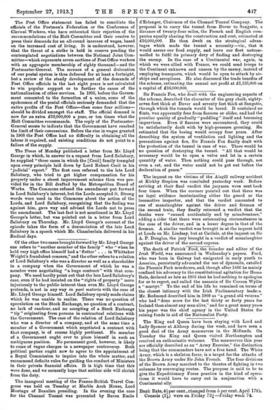Of the other two cases brought forward by Mr. Lloyd
George one refers to "another member of the family" who "when he held very high office himself had a flutter' . . . in Whittaker Wright's fraudulent concern," and the other refers to a relation of Lord Salisbury's who was a director as well as a shareholder in a company when the Government of which he was a member were negotiating "a huge contract" with that com- pany. We need hardly point out that the late Lord Salisbury's case, even if be had insisted on the "rights of property" more injuriously to the public interest than even Mr. Lloyd George pretends, is not in any way in pan i materia with the case of Mr. Lloyd George himself. Lord Salisbury openly made claims which he was unable to realize. There was no question of speculation on the Stock Exchange, no question of a contract, no lack of candour, and no accepting of a Stock Exchange "tip " originating from persons in contractual relations with the Government. The case of the relation of Lord Salisbury who was a director of a company, and at the same time a member of a Government which negotiated a contract with that company, is of course highly pertinent. No member of a Government ought ever to place himself in such an ambiguous position. No permanent good, however, is likely to come of vague charges in a newspaper controversy. Both political parties ought now to agree to the appointment of a Royal Commission to inquire into the whole matter, and recommend definite rules for guiding the conduct of Ministers in their private financial affairs. It is high time that this were done, and we earnestly hope that neither side will shrink from the duty.










































 Previous page
Previous page